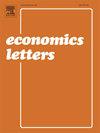知足与不过分:充分主义-限制主义的特征
IF 2.1
4区 经济学
Q2 ECONOMICS
引用次数: 0
摘要
充分主义是分配正义的一个重要框架,它主张每个人都应该有足够的资源来满足最低门槛。相比之下,限制主义认为,个人的收入或财富不应超过规定的上限。虽然后者在政治哲学和政策辩论中得到了关注,但在正式的规范经济学中,它在很大程度上仍未得到探索。本文通过提供一个整合了充分主义和极限主义原则的社会福利标准的公理化特征来弥合这一差距。我们将这些双重承诺形式化,并调查其对资源分配的影响。该分析揭示了这种混合方法的理论基础及其与规范分析的潜在相关性。本文章由计算机程序翻译,如有差异,请以英文原文为准。
Having enough and not having too much: A characterization of sufficientarianism–limitarianism
Sufficientarianism, a prominent framework in distributive justice, asserts that everyone should have enough resources to meet a minimum threshold. Limitarianism, by contrast, holds that no individual should possess more than a specified upper limit of income or wealth. While the latter has gained attention in political philosophy and policy debates, it remains largely unexplored in formal normative economics. This paper bridges this gap by offering an axiomatic characterization of a social welfare criterion that integrates sufficientarian and limitarian principles. We formalize these dual commitments and investigate their implications for resource allocation. The analysis sheds light on the theoretical underpinnings of this hybrid approach and its potential relevance for normative analysis.
求助全文
通过发布文献求助,成功后即可免费获取论文全文。
去求助
来源期刊

Economics Letters
ECONOMICS-
CiteScore
3.20
自引率
5.00%
发文量
348
审稿时长
30 days
期刊介绍:
Many economists today are concerned by the proliferation of journals and the concomitant labyrinth of research to be conquered in order to reach the specific information they require. To combat this tendency, Economics Letters has been conceived and designed outside the realm of the traditional economics journal. As a Letters Journal, it consists of concise communications (letters) that provide a means of rapid and efficient dissemination of new results, models and methods in all fields of economic research.
 求助内容:
求助内容: 应助结果提醒方式:
应助结果提醒方式:


